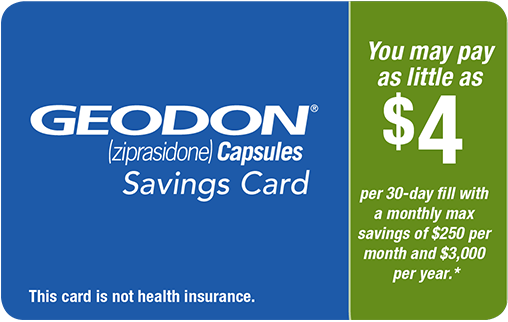WARNING: INCREASED DEATH IN ELDERLY PATIENTS WITH DEMENTIA-RELATED PSYCHOSIS
GEODON is not approved for the treatment of patients with dementia-related psychosis. Elderly patients with dementia-related psychosis (having lost touch with reality due to confusion and memory loss) treated with this type of medicine are at an increased risk of death, compared to sugar pill.
GEODON may increase the risk of changes to your heart rhythm. You should not take GEODON if you have certain kinds of heart conditions that change your heart rhythm, a recent heart attack, heart failure, or take certain medicines known to change heart rhythm. It is important to talk to your doctor about this possible side effect. Call your doctor right away if you faint, pass out, or feel a change in your heartbeat.
It is important to tell your doctor about any other medicines that you take, including non-prescription medicines, supplements, and herbal medicines.
If you experience a high fever, stiff muscles, shaking, confusion, sweating, or increased heart rate or blood pressure, tell your doctor right away. These can be signs of a rare but potentially fatal condition called neuroleptic malignant syndrome (NMS).
Delayed-onset drug reaction called Drug Reaction with Eosinophilia and Systemic Symptoms (DRESS) can occur with ziprasidone. Signs of DRESS may include rash, fever, and swollen lymph nodes. Other severe cutaneous adverse reactions (SCAR), such as Stevens-Johnson syndrome, can occur with ziprasidone. Signs of Stevens-Johnson syndrome may include rash with blisters, which could include ulcers in mouth, skin shedding, fever, and target-like spots in the skin. DRESS and other SCAR are sometimes fatal; therefore, call your health care professional(s) and seek immediate care if you develop any of these signs or symptoms.
If you experience abnormal or uncontrollable facial or body movements, notify your doctor. These could be a sign of tardive dyskinesia (TD), a potentially permanent condition whose risk increases with the length of treatment but which can also occur after brief periods at low doses.
If you have diabetes or have risk factors or symptoms of diabetes, your blood sugar should be monitored. Symptoms include excessive thirst, urination, appetite, and weakness. High blood sugar has been reported with GEODON and medicines like it. In some cases, extreme high blood sugar can lead to coma or death. Increases in cholesterol and weight gain have also been reported with medicines like GEODON.
Tell your doctor if you are pregnant or intend to become pregnant. Breastfeeding is not recommended.
Antipsychotic drugs (like GEODON) may cause drowsiness, dizziness, or lightheadedness upon standing, which could lead to falls, fractures, or other injuries. If you experience these symptoms, tell your doctor.
If you experience a rash or seizures, tell your doctor. Also tell your doctor if you have thoughts of suicide.
Other risks may include decreases in white blood cells (which can be serious), trouble swallowing, high prolactin levels, and impairment in judgment or motor skills. Until you know how GEODON affects you, you should not drive or operate machinery.
Do not drink alcohol while taking GEODON. Avoid becoming overheated or dehydrated.
Common side effects of GEODON in adults include:
- Feeling unusually tired or sleepy
- Nausea or upset stomach
- Constipation
- Dizziness
- Restlessness
- Abnormal muscle movements, including tremor, shuffling, and uncontrolled involuntary movements
- Diarrhea
- Rash
- Increased cough/runny nose
In short-term bipolar mania clinical studies, 4.9% of GEODON-treated patients gained significant weight (7% or more of body weight) vs 3.3% for placebo.
In a long-term bipolar maintenance clinical study, patients who tolerated GEODON plus lithium or valproate (Depakote®) for 10-16 weeks were either continued on GEODON or switched to placebo for up to 6 months. During these 6 months, 5.6% of patients in both groups gained significant weight. These results do not include patients who did not complete the study.
In short-term schizophrenia clinical studies, 10% of GEODON-treated patients gained significant weight vs 4% for placebo.
Since there is no experience regarding the safety of administering GEODON for Injection to schizophrenic patients already taking oral GEODON, the practice of co-administration is not recommended.
INDICATIONS
GEODON is a type of prescription medicine called a psychotropic, also known as an atypical antipsychotic. GEODON can be used to treat symptoms of schizophrenia and acute manic or mixed episodes associated with bipolar disorder. GEODON can also be used as maintenance treatment of bipolar disorder when added to lithium or valproate. GEODON may increase the risk of changes to your heart rhythm. In some cases, these types of changes can be fatal, though it is unknown whether this is the case with GEODON. It is important to talk to your doctor about this potential side effect, as your doctor may consider a different medicine first.
Please see Full Prescribing Information, including BOXED WARNING and Patient Information.




